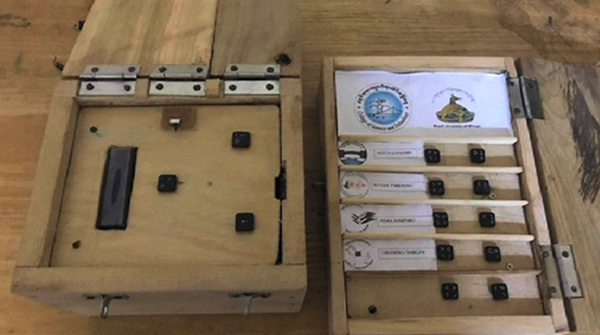 Wouldn’t it be a thing of wonder if the visually impaired population of the country could go to polls and cast votes for the candidates of their choice on their own? Innovation could bring about a solution to the long-standing issue of voting secrecy for the country’s visually impaired people during every election. A group of youth has developed a model of electronic voting system for the visually impaired.
Wouldn’t it be a thing of wonder if the visually impaired population of the country could go to polls and cast votes for the candidates of their choice on their own? Innovation could bring about a solution to the long-standing issue of voting secrecy for the country’s visually impaired people during every election. A group of youth has developed a model of electronic voting system for the visually impaired.
In the present scenario, voters who are visually impaired need somebody to escort them to the voting compartment. The assistant knows who the person voted for and the vote is no more a secret.
To give a visually impaired person the opportunity to cast a private and independent vote, a group of youth has developed an electronic voting system model. It features audio interaction that will let the visually impaired person know the candidate they want to vote for at the press of a button.
“In the ballot unit, the voters can listen to the names of the candidates using a set of buttons which will be passed through the headset. Once the right candidate is found, the voter can vote using another set of buttons aligned respectively in another column,” Dema Choki said.
Dema and her friends are hopeful that the model will become a real-time product in future. If that happens, it would give a sense of inclusiveness among the country’s visually impaired population of close to 1,500 people.
“As of now, we are done with the initial prototyping phase. Since it is not mechanically manufactured, it has some technical glitches. To make it a robust and real-time product, we still have some portion of work to do for which it will take some time. But we are very sure that it will become a product one day,” added Dema.
Dema Choki presented the idea yesterday alongside two other ideas, at the United Nations Development Programme’s (UNDP) virtual launch of an accelerator lab. Accelerator lab is a unit to promote innovative ideas and solutions for developmental challenges.
“Innovation has become the buzzword and it is often associated with technology. We in UNDP see innovation as doing things differently,” said Azusa Kubota, the Resident Representative of UNDP Bhutan.
She added there is a need for policies and support from the government for innovation to thrive, “indeed, many governments around the world have established a facility to encourage innovation in public service delivery. This type of risk-sharing and experimental approach has become even more relevant and important in the wake of fast-shrinking fiscal space faced by public institutions during the COVID crisis.”
Before the launch of the lab, the UNDP’s innovation unit together with the government started projects to study the issues of waste management in Thimphu and youth unemployment.
Through the accelerator lab, the UNDP plans to identify partners from the government agencies, Civil Society Organisations and local innovators to bring innovative solutions to address issues.
Phub Gyem






